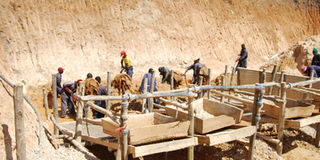Laws block Shs6 trillion mining potential

Artisanal miners in Engaju Sub-county Buhweju District. Mining has the potential to create 700,000 jobs. PHOTO BY FELIX AINEBYOONA
What you need to know:
- Dr Jennifer Hinton also revealed that with proper planning, the mining sector would substantially cut back on importation of ceramics.
- Mr Cedric Merel, the European Union’s head of cooperation, said with Uganda committing to join the Extractive Industry Transparency Initiative by 2019, contribution to the sector with improve to Shs300b.
Kampala. Government should quickly refine Mining Regulations and the Mining Act 2003 if Ugandans are to benefit from the growth in the sector.
Speaking on Tuesday in Kampala during the launch of the Baseline Assessment and Value Chain Analysis of Development Minerals report, Dr Jennifer Hinton, the Lead Researcher, said laws on mining should be refined to capture trends in the sector to anchor it on areas of institutional growth.
Mining, according to the report, has the capacity to generate up to $1.6b (Shs6 trillion) annually.
However, according to Dr Jennifer Hinton, “all this depends on how fast” government can ensure that policies and laws are refined to put current trends in perspective.
The sector, according to the report, if well planned, also has the capacity to create more than 700,000 jobs every three years, especially from sand mining, clay and bricks making, among many others.
Uganda’s mineral sector, according to the 2014 National Mineral Survey, on average generates more than $75m (Shs274b) in revenue.
The study, which was jointly funded by the United Nations Development Programme and the European Union, captures 22 districts across the country, concentrating on 43 sites and 73 points of sales.
Almost 12,800 sites, according to the report, have been abandoned across the districts sampled not withstanding their potential to produce more minerals.
Dr Jennifer Hinton also revealed that with proper planning, the mining sector would substantially cut back on importation of ceramics.
Mr Cedric Merel, the European Union’s head of cooperation, said with Uganda committing to join the Extractive Industry Transparency Initiative by 2019, contribution to the sector with improve to Shs300b.
“We will support the Ministry of Energy and Mineral Development to implement institutional programmes that enhance accountability, safety and human rights issues around the country’s mineral sector,” he said.
Mr Zacharia Baguma, the director for geology and mining in the Ministry of Energy echoed government’s commitment towards complying with “environmental concerns, infrastructure, health and safety concerns.
Setting the stage
Once the amendments in the Mining Law are passed by Cabinet and Parliament, according to the report, the stage will be set for rapid growth of artisanal miners as well as transformation into light value addition, he hopes.
Ms Irene Nakalyango, the chief executive officer of the Chamber of Mines, says that they have been pushing for required however, many of they are yet to be delivered.




